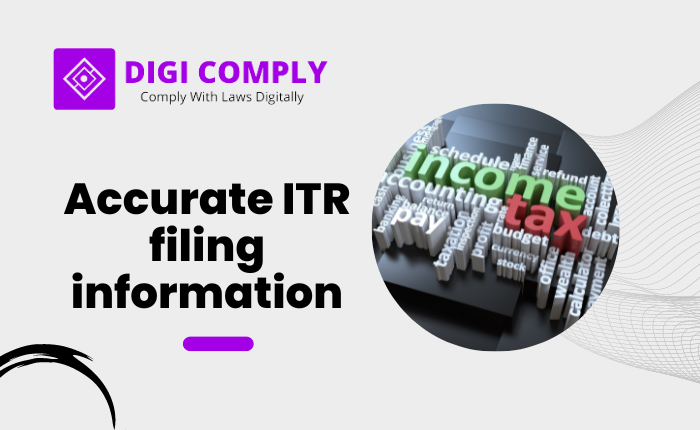Ensuring the accurate filing of your Income Tax Return (ITR) is of paramount importance as it directly impacts your financial compliance and tax liabilities. To achieve this, it involves incorporating vital information from your Annual Information Statement (AIS), which is a critical document that provides a comprehensive overview of various financial transactions and incomes associated with your Permanent Account Number (PAN). However, as with any data collection process, discrepancies or omissions in the AIS can sometimes occur, which can create confusion and complications during the filing process.
To navigate through such situations effectively and ensure a seamless filing experience, it is essential to adopt a proactive and diligent approach. Here are some crucial steps you should take to address and rectify any discrepancies or missing data in your AIS:
1. Verify Sources of Income: One of the common mistakes taxpayers make is assuming that the absence of income in the AIS means there is no income from that particular source.
- This can lead to potential underreporting of income and, consequently, attract tax-related penalties. To avoid this, it is imperative to cross-check all your income sources with the information provided in the AIS.
- If you find any earnings that are not reflected in the AIS, you must promptly obtain the necessary information from the respective financial institutions and ensure to mention this additional income in your ITR. By doing so, you maintain accuracy and transparency in your tax declarations.
2. Resolve Discrepancies: In some cases, you may notice differences between the income figures mentioned in the AIS and the interest certificate provided by your bank. When faced with such discrepancies, it is crucial to prioritize the bank’s certificate for accuracy. Relying on the bank’s documentation helps ensure that your ITR aligns with the actual income you earned, minimizing the risk of income tax notices or audits.
3. Correct Errors in AIS: If you identify any inaccuracies in your AIS, such as the display of higher income than what was actually earned, it is essential to address and correct these errors promptly.
- Delaying the correction process may lead to complications during tax assessments, potentially leading to additional taxes and penalties.
- The AIS should ideally reflect the accurate and updated information shared by various financial institutions with the income tax department, making it necessary to rectify any discrepancies as soon as possible.
4. Provide Feedback for Correction: A collaborative approach with the concerned financial institutions can significantly contribute to resolving discrepancies. If you come across disparities between your AIS and the financial institution’s statement, it is crucial to inform the concerned institution about the error and request them to rectify it. Once the correction is made, ensure that you file your ITR based on the revised and accurate information.
5. Inform the Bank about Errors: In some instances, discrepancies in your AIS may result from errors made by the bank in providing the necessary information. If you suspect any such errors, it is essential to promptly notify the bank about the discrepancies you have identified. This proactive communication allows the bank to investigate the matter and provide you with the correct income amount, helping you maintain the integrity of your tax filings.
6. File Revised ITR if Necessary: Despite exercising due diligence, there might be situations where you inadvertently inaccurately reported your interest income, and upon verification, the AIS is found to be correct. In such cases, it is crucial to file a revised ITR promptly to rectify the error and ensure compliance. Filing a revised ITR is a responsible approach to mitigate any potential income tax notices or penalties.
Understanding how AIS Information is Populated is crucial in comprehending the root cause of discrepancies.
- The AIS is generated based on the information furnished by various financial entities such as banks, mutual fund houses, and companies, who are required to share transaction details associated with your PAN with the income tax department.
- It is essential to recognize that any discrepancies between your AIS and the financial statement from a financial institution may arise due to mismatched or omitted data during this data collection process.
For instance, consider a scenario where your AIS displays savings account interest of Rs. 2,000, but your bank’s statement only reflects Rs. 200 as the total interest paid to you for a specific financial year. In this situation, it is your responsibility to promptly inform the income tax department about the discrepancy and get your AIS corrected accordingly. Additionally, it is advisable to communicate with the bank to ascertain if there are any errors from their end while generating the bank statement.
- The AIS serves the crucial purpose of assisting taxpayers in reconciling the financial information available to them with the data reported to the income tax department by various financial entities.
- Therefore, if you possess adequate documentation supporting a financial transaction mentioned in the AIS, you can confidently rely on it and provide feedback to correct any inaccuracies promptly.
In conclusion, adhering to these steps and ensuring the accuracy of your AIS is essential for a seamless and compliant tax-filing process. By proactively addressing discrepancies and promptly correcting any errors, you can confidently file your ITR, reduce the risk of tax-related complications, and maintain a strong financial standing with the tax authorities. Remember, staying vigilant, organized, and responsive to rectify any discrepancies will contribute to a smooth and hassle-free tax-filing experience.
If You have any queries then connect with us at support@legalsuvidha.com or info@digicomply.in & contact us & stay updated with our latest blogs & articles





